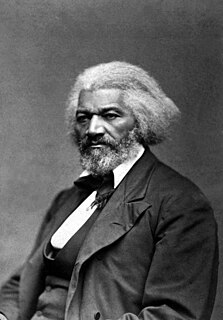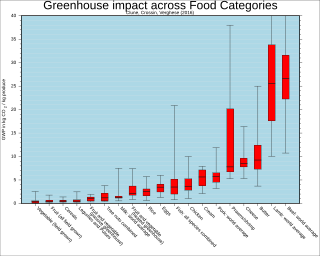Related Research Articles

Frederick Douglass was an American social reformer, abolitionist, orator, writer, and statesman. After escaping from slavery in Maryland, he became a national leader of the abolitionist movement in Massachusetts and New York, becoming famous for his oratory and incisive antislavery writings. Accordingly, he was described by abolitionists in his time as a living counterexample to slaveholders' arguments that slaves lacked the intellectual capacity to function as independent American citizens. Likewise, Northerners at the time found it hard to believe that such a great orator had once been a slave.

The Montreal Protocol on Substances that Deplete the Ozone Layer, also known simply as the Montreal Protocol, is an international treaty designed to protect the ozone layer by phasing out the production of numerous substances that are responsible for ozone depletion. Signed 26 August 1987, it was made pursuant to the 1985 Vienna Convention for the Protection of the Ozone Layer, which established the framework for international cooperation in addressing ozone depletion. The Montreal Protocol entered into force on 26 August 1989, and has since undergone nine revisions, in 1990 (London), 1991 (Nairobi), 1992 (Copenhagen), 1993 (Bangkok), 1995 (Vienna), 1997 (Montreal), 1998 (Australia), 1999 (Beijing) and 2016 (Kigali).
Environmental economics is a sub-field of economics concerned with environmental issues. It has become a widely studied subject due to growing environmental concerns in the twenty-first century. Environmental economics "undertakes theoretical or empirical studies of the economic effects of national or local environmental policies around the world.... Particular issues include the costs and benefits of alternative environmental policies to deal with air pollution, water quality, toxic substances, solid waste, and global warming."
Environmental finance is a field within finance that employs market-based environmental policy instruments to improve the ecological impact of investment strategies. The primary objective of environmental finance is to regress the negative impacts of climate change through pricing and trading schemes. The field of environmental finance was established in response to the poor management of economic crises by government bodies globally. Environmental finance aims to reallocate a businesses resources to improve the sustainability of investments whilst also retaining profit margins.
Occupational Therapists (OTs) are health care professionals specializing in occupational therapy and occupational science. OTs and occupational therapy assistants (OTAs) use scientific bases, and a holistic perspective to promote a person's ability to fulfill their daily routines and roles. OTs have immense training in the physical, psychological, and social aspects of human functioning deriving from an education grounded in anatomical and physiological concepts, and psychological perspectives. They enable individuals across the lifespan by optimizing their abilities to perform activities that are meaningful to them ("occupations"). Human occupations include activities of daily living, work/ vocation, play, education, leisure, rest and sleep, and social participation.
Wage slavery is a term describing a situation in which a person's livelihood depends on wages or a salary, especially when the dependence is total and immediate. It has been used to criticise exploitation of labour and social stratification, with the former seen primarily as unequal bargaining power between labour and capital and the latter as a lack of workers' self-management, fulfilling job choices and leisure in an economy. The criticism of social stratification covers a wider range of employment choices bound by the pressures of a hierarchical society to perform otherwise unfulfilling work that deprives humans of their "species character" not only under threat of starvation or poverty, but also of social stigma and status diminution. Historically, some socialist organisations and activists have espoused workers' self-management or worker cooperatives as possible alternatives to wage labour.
A prophecy is a message that is claimed by a prophet to have been communicated to them by a deity. Such messages typically involve inspiration, interpretation, or revelation of divine will concerning the prophet's social world and events to come.
In the field of psychology, cognitive dissonance occurs when a person holds contradictory beliefs, ideas, or values, and is typically experienced as psychological stress when they participate in an action that goes against one or more of them. According to this theory, when two actions or ideas are not psychologically consistent with each other, people do all in their power to change them until they become consistent. The discomfort is triggered by the person's belief clashing with new information perceived, wherein they try to find a way to resolve the contradiction to reduce their discomfort.
A self-fulfilling prophecy is the sociopsychological phenomenon of someone "predicting" or expecting something, and this "prediction" or expectation coming true simply because the person believes it will and the person's resulting behaviors align to fulfill the belief.
A prediction, or forecast, is a valid deductive statement about a future event. They are often, but not always, based upon experience or knowledge. There is no universal agreement about the exact difference from "estimation"; different authors and disciplines ascribe different connotations.
In social philosophy, objectification is the act of treating a person, or sometimes an animal, as an object or a thing. It is part of dehumanization, the act of disavowing the humanity of others. Sexual objectification, the act of treating a person as a mere object of sexual desire, is a subset of objectification, as is self-objectification, the objectification of one's self. In Marxism, the objectification of social relationships is discussed as "reification".
David Sztybel is a Canadian philosopher specializing in animal ethics.
A green economy is an economy that aims at reducing environmental risks and ecological scarcities, and that aims for sustainable development without degrading the environment. It is closely related with ecological economics, but has a more politically applied focus. The 2011 UNEP Green Economy Report argues "that to be green, an economy must not only be efficient, but also fair. Fairness implies recognizing global and country level equity dimensions, particularly in assuring a Just Transition to an economy that is low-carbon, resource efficient, and socially inclusive."

Environmental vegetarianism is the practice of vegetarianism when motivated by the desire to create a sustainable diet that avoids the negative environmental impact of meat production. Livestock as a whole is estimated to be responsible for around 18% of global greenhouse gas emissions. As a result, significant reduction in meat consumption has been advocated by, among others, the Intergovernmental Panel on Climate Change in their 2019 special report and as part of the 2017 World Scientists' Warning to Humanity.
Environmental governance is a concept in political ecology and environmental policy that advocates sustainability as the supreme consideration for managing all human activities—political, social and economic. Governance includes government, business and civil society, and emphasizes whole system management. To capture this diverse range of elements, environmental governance often employs alternative systems of governance, for example watershed-based management.

The Interior Alaskan wolf(Canis lupus pambasileus), also known as the Yukon wolf, is a subspecies of gray wolf native to parts of British Columbia, the Northwest Territories, Interior Alaska and Yukon.

Pragmatic ethics is a theory of normative philosophical ethics and meta-ethics. Ethical pragmatists such as John Dewey believe that some societies have progressed morally in much the way they have attained progress in science. Scientists can pursue inquiry into the truth of a hypothesis and accept the hypothesis, in the sense that they act as though the hypothesis were true; nonetheless, they think that future generations can advance science, and thus future generations can refine or replace their accepted hypotheses. Similarly, ethical pragmatists think that norms, principles, and moral criteria are likely to be improved as a result of inquiry.

Anthony Weston is an American writer, teacher, and philosopher. He is an author of widely used primers in critical thinking and ethical practice and of a variety of unconventional books and essays on philosophical topics.
Anticipatory governance, or anticipatory profiling, is the practice used by the state to collect information and data about its citizens in order to assess events or behaviours in a predictable manner based on the knowledge gathered. Anticipatory governance is also a method of decision making that uses predictive measures to anticipate possible outcomes to then make decisions based on the data provided. Anticipatory governance is a system of governing that is made up of processes and institutions that rely on foresight and predictions to decrease risk and develop efficient methods to address events in their early conception or prevent them altogether.

Sustainable Development Goal 12 is about "responsible consumption and production". It is one of the 17 Sustainable Development Goals established by the United Nations in 2015. The official wording of SDG 12 is "To ensure sustainable consumption and production patterns". SDG 12 is meant to ensure good use of resources, improving energy efficiency, sustainable infrastructure, and providing access to basic services, green and decent jobs and ensuring a better quality of life for all. SDG 12 has 11 targets to be achieved by at least 2030 and progress toward the targets is measured using 13 indicators.
References
- ↑ Weston, Anthony (1994). Back to Earth: Tomorrow's Environmentalism. Philadelphia: Temple University Press.
- ↑ Jickling, B., Lotz-Sisitka, H., O’Donoghue, R., Ogbuigwe. A. (2006). "Environmental Education, Ethics, and Action" (PDF). United Nations Education Program (UNEP). p. 12.CS1 maint: multiple names: authors list (link)
- ↑ Schelling, Thomas (1978). Micromotives and Macrobehavior . New York: W W Norton and Company. pp. 115–116.
- ↑ Weston, Anthony (1996). "Self-validating reduction: A theory of environmental devaluation". Environmental Ethics. 18: 115–132.
- ↑ Douglass, Frederick (1982). "The Claims of the Negro Ethnologically Considered". The Frederick Douglass Papers. Series One. 2: 507.
- ↑ Shepard, Paul (1982). Nature and Madness. San Francisco: Sierra Club Books. p. 38.